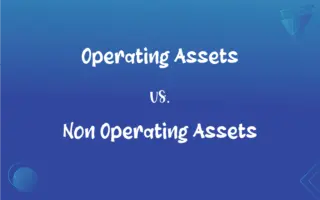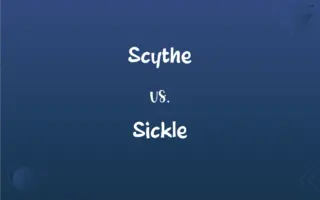BSc vs. BEng: What's the Difference?
Edited by Aimie Carlson || By Janet White || Published on February 22, 2024
BSc (Bachelor of Science) focuses on theoretical knowledge, while BEng (Bachelor of Engineering) emphasizes practical application in engineering fields.

Key Differences
BSc, or Bachelor of Science, typically covers a broad range of scientific subjects, offering a theoretical and analytical approach to learning. This includes disciplines like biology, chemistry, physics, and mathematics. In contrast, BEng, standing for Bachelor of Engineering, is more specialized and focused on the practical application of engineering principles. It is tailored towards specific fields such as mechanical, civil, or electrical engineering.
The curriculum in a BSc program is designed to provide a foundational understanding of scientific concepts, encouraging analytical thinking and research skills. This approach is more academic and theoretical. On the other hand, a BEng program is structured to impart practical skills and technical knowledge required in engineering. It often includes hands-on projects, internships, and industry-specific training.
Graduates with a BSc degree often pursue careers in research, education, or specialized scientific fields. They may also continue their education with a Master's or PhD. BEng graduates, however, are typically geared towards careers in engineering sectors, working as civil, mechanical, electrical, or software engineers. Their education is more directly aligned with industry requirements.
Both BSc and BEng programs usually span over three to four years, but the BEng might have more stringent requirements due to its practical nature. BEng programs often require internships or industrial placements as part of the degree, whereas BSc degrees may offer these as optional.
BEng programs are often accredited by professional engineering bodies and are tailored to meet industry standards, which is crucial for pursuing a career as a licensed engineer. BSc degrees, while also accredited by educational bodies, focus more on academic standards and may not always align directly with specific professional qualifications.
ADVERTISEMENT
Comparison Chart
Focus
Theoretical knowledge
Practical application
Curriculum
Broad, diverse subjects
Specialized engineering fields
Career Path
Research, education
Engineering sectors
Duration
3-4 years, academic focus
3-4 years, includes internships
Accreditation
Academic standards
Industry standards
ADVERTISEMENT
BSc and BEng Definitions
BSc
BSc provides a comprehensive understanding of scientific principles.
Her BSc in Mathematics included courses in statistics and calculus.
BEng
BEng is an undergraduate degree specializing in engineering disciplines.
He graduated with a BEng in Mechanical Engineering from Stanford.
BSc
BSc is an undergraduate degree focusing on scientific disciplines.
She earned her BSc in Biology from the University of Michigan.
BEng
BEng is oriented towards preparing students for professional engineering roles.
After his BEng in Electrical Engineering, he worked for a major tech company.
BSc
BSc degree often serves as a foundation for further scientific study.
Her BSc in Chemistry paved the way for her PhD in Pharmacology.
BEng
BEng stands for Bachelor of Engineering, combining theory with practical skills.
Her BEng in Civil Engineering led to a successful career in construction.
BSc
BSc stands for Bachelor of Science, awarded in various science fields.
After completing his BSc in Physics, he pursued a career in research.
BEng
BEng focuses on applying scientific principles in real-world engineering problems.
With her BEng in Chemical Engineering, she developed new sustainable materials.
BSc
BSc encompasses both pure and applied sciences.
He received a BSc in Environmental Science, focusing on sustainable practices.
BEng
BEng degree includes hands-on experience and internships.
His BEng in Software Engineering included a six-month internship at a software firm.
FAQs
Are BSc degrees only in pure sciences?
No, BSc degrees can be in pure or applied sciences.
Can a BSc lead to a career in research?
Yes, a BSc is often a stepping stone to research careers.
Does BEng focus on theoretical knowledge?
BEng combines theory with practical application.
What does BSc stand for?
Bachelor of Science.
What does BEng stand for?
Bachelor of Engineering.
Is BEng suitable for a career in industry?
Yes, BEng is tailored for careers in the engineering industry.
Are BEng degrees recognized globally?
Recognition varies, but many are globally acknowledged.
Can BSc graduates pursue engineering?
Typically, further specialized education is needed.
Is a BSc a prerequisite for a master's in science?
Usually, a BSc is required for a science master's program.
Can BSc holders teach at the university level?
Generally, further qualifications like a PhD are required.
Can BSc graduates apply for engineering master's programs?
It's possible, but may require additional prerequisites.
Are BSc programs flexible in course selection?
Many BSc programs offer a range of elective courses.
Are internships mandatory in BEng programs?
Many BEng programs require or highly recommend internships.
Is a BEng more specialized than a BSc?
Yes, BEng is more specialized towards engineering.
Can BEng graduates become licensed engineers?
Yes, especially with accredited BEng programs.
Do BSc programs include lab work?
Yes, most BSc programs have laboratory components.
Is practical experience part of a BEng curriculum?
Yes, practical experience is a key component.
Do BSc degrees require a thesis?
Some BSc programs may require a thesis or final project.
What is the typical duration of a BEng program?
Typically, 3-4 years, depending on the country and institution.
Do BEng degrees focus on specific engineering fields?
Yes, they focus on fields like mechanical, civil, or electrical engineering.
About Author
Written by
Janet WhiteJanet White has been an esteemed writer and blogger for Difference Wiki. Holding a Master's degree in Science and Medical Journalism from the prestigious Boston University, she has consistently demonstrated her expertise and passion for her field. When she's not immersed in her work, Janet relishes her time exercising, delving into a good book, and cherishing moments with friends and family.
Edited by
Aimie CarlsonAimie Carlson, holding a master's degree in English literature, is a fervent English language enthusiast. She lends her writing talents to Difference Wiki, a prominent website that specializes in comparisons, offering readers insightful analyses that both captivate and inform.








































































